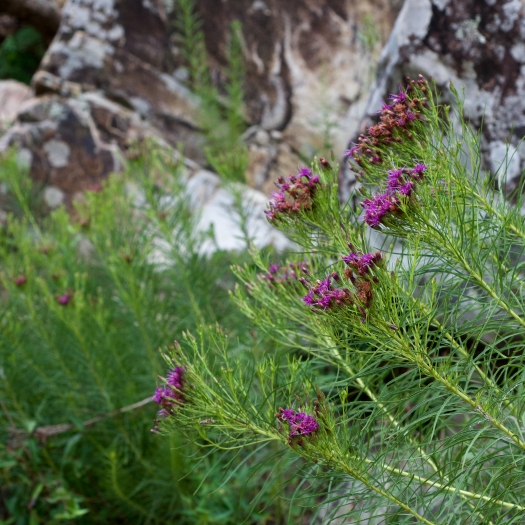Narrowleaf Ironweed
(Vernonia lettermannii)
Narrowleaf Ironweed (Vernonia lettermannii)
/
/

Eric Hunt
CC BY-SA 4.0
Image By:
Eric Hunt
Recorded By:
Copyright:
CC BY-SA 4.0
Copyright Notice:
Photo by: Eric Hunt | License Type: CC BY-SA 4.0 | License URL: https://creativecommons.org/licenses/by-sa/4.0 | Uploader: Eric in SF | Publisher: Wikimedia Commons | Title: Vernonia_lettermanii.jpg | Notes: Transferred from Flickr via [[Commons:Flickr2Commons|Flickr2Commons]] |

Estimated Native Range
Summary
Vernonia lettermannii, commonly known as Narrowleaf Ironweed, is a deciduous perennial herb native to the rocky prairies and glades of Arkansas and Oklahoma. It typically grows to a height and width of 2-3 feet (0.6-0.9 meters), forming a compact clump of narrow, lance-shaped leaves. The plant is known for its profuse clusters of small, fluffy, deep purple flowers that bloom from late summer into fall, adding vibrant color to the garden. The flowers are highly attractive to butterflies and other pollinators, making it a beneficial addition to wildlife gardens.
Narrowleaf Ironweed is valued for its drought tolerance and ability to thrive in poor, rocky soils, making it an excellent choice for xeriscaping and naturalistic plantings. It is also used in borders, meadows, and as a cut flower due to its showy blooms. This plant prefers full sun to part shade and requires well-drained soil. While it is adaptable to various soil conditions, it performs best in soils that are not overly rich or moist. It is generally low-maintenance, but deadheading can encourage a second bloom and prevent self-seeding. Despite its hardiness, it can be susceptible to rust and mildew in humid conditions.CC BY-SA 4.0
Narrowleaf Ironweed is valued for its drought tolerance and ability to thrive in poor, rocky soils, making it an excellent choice for xeriscaping and naturalistic plantings. It is also used in borders, meadows, and as a cut flower due to its showy blooms. This plant prefers full sun to part shade and requires well-drained soil. While it is adaptable to various soil conditions, it performs best in soils that are not overly rich or moist. It is generally low-maintenance, but deadheading can encourage a second bloom and prevent self-seeding. Despite its hardiness, it can be susceptible to rust and mildew in humid conditions.CC BY-SA 4.0
Plant Description
- Plant Type: Herb
- Height: 2-3 feet
- Width: 2-3 feet
- Growth Rate: Moderate
- Flower Color: Purple
- Flowering Season: Summer, Fall
- Leaf Retention: Deciduous
Growth Requirements
- Sun: Full Sun, Part Shade
- Water: Low, Medium
- Drainage: Medium, Fast
Common Uses
Bank Stabilization, Bee Garden, Bird Garden, Border Plant, Butterfly Garden, Deer Resistant, Drought Tolerant, Groundcover, Hummingbird Garden, Low Maintenance, Rock Garden, Showy Flowers, Street Planting
Natural Habitat
Rocky prairies and glades in Arkansas and Oklahoma
Other Names
Common Names: Lettermann’s Ironweed, Slimleaf Ironweed
Scientific Names: , Vernonia lettermannii, Cacalia lettermannii,
GBIF Accepted Name: Vernonia lettermannii Engelm. ex A.Gray